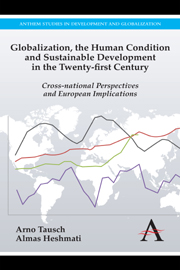 Globalization, the Human Condition and Sustainable Development in the Twenty-First Century
Globalization, the Human Condition and Sustainable Development in the Twenty-First Century Book contents
- Frontmatter
- Contents
- Miscellaneous frontmatter
- List of Abbreviations
- Glossary of Key Terms
- Foreword
- Preface
- 1 Should the Musicians Continue to Play?
- 2 Background
- 3 Methods
- 4 Cross-national Results: Beyond the Pro-globalist Development Approach of the European Commission
- 5 Final Cross-national Results for the Combined Development Indicator
- 6 A Time Series Perspective on Globalization, Growth and Inequality
- 7 Conclusions
- Appendices
- References
- Index of Persons and Authorships
- Index of Subjects and Countries
1 - Should the Musicians Continue to Play?
Published online by Cambridge University Press: 05 July 2012
- Frontmatter
- Contents
- Miscellaneous frontmatter
- List of Abbreviations
- Glossary of Key Terms
- Foreword
- Preface
- 1 Should the Musicians Continue to Play?
- 2 Background
- 3 Methods
- 4 Cross-national Results: Beyond the Pro-globalist Development Approach of the European Commission
- 5 Final Cross-national Results for the Combined Development Indicator
- 6 A Time Series Perspective on Globalization, Growth and Inequality
- 7 Conclusions
- Appendices
- References
- Index of Persons and Authorships
- Index of Subjects and Countries
Summary
Look around, and Europe is in crisis. At the time of writing, Greece, Ireland and Portugal are on the verge of an economic and social abyss, severe doubts about the very future of the European Monetary Union are growing, and austerity packages are being implemented across the European continent. Centrifugal political forces are on the rise, just as are xenophobia, racism and social exclusion. The promised lands of the most competitive and dynamic knowledge-based economy in the world, an economy capable of sustainable economic growth with more and better jobs and greater social cohesion – as envisaged by the European heads of governments in March 2000 at their European Council meeting in Lisbon, Portugal – seem to be further away than ever before. It would be difficult to find believers in this noble vision of a sustainably growing and socially coherent Europe nowadays in any country of the EU, let alone in countries like Greece, Ireland, Italy, Spain and Portugal. Even in the richer, developed European countries of the old economic centres, pessimism is on the rise. However, for the quantitative social scientist, profound economic crises (the Great Depression of the 1930s, the ‘oil crisis’ of the 1970s, the current world recession) always seem to be appropriate times for reconsidering basic principles of economics and the social sciences.
Always, such times were also propitious to discover or rediscover the fact that unequal relationships profoundly characterize the world economy and that the effects of dependency and the role a nation plays in the world system profoundly affect the economic and social trajectory of a country.
- Type
- Chapter
- Information
- Globalization, the Human Condition and Sustainable Development in the Twenty-First CenturyCross-National Perspectives and European Implications, pp. 1 - 8Publisher: Anthem PressPrint publication year: 2012


